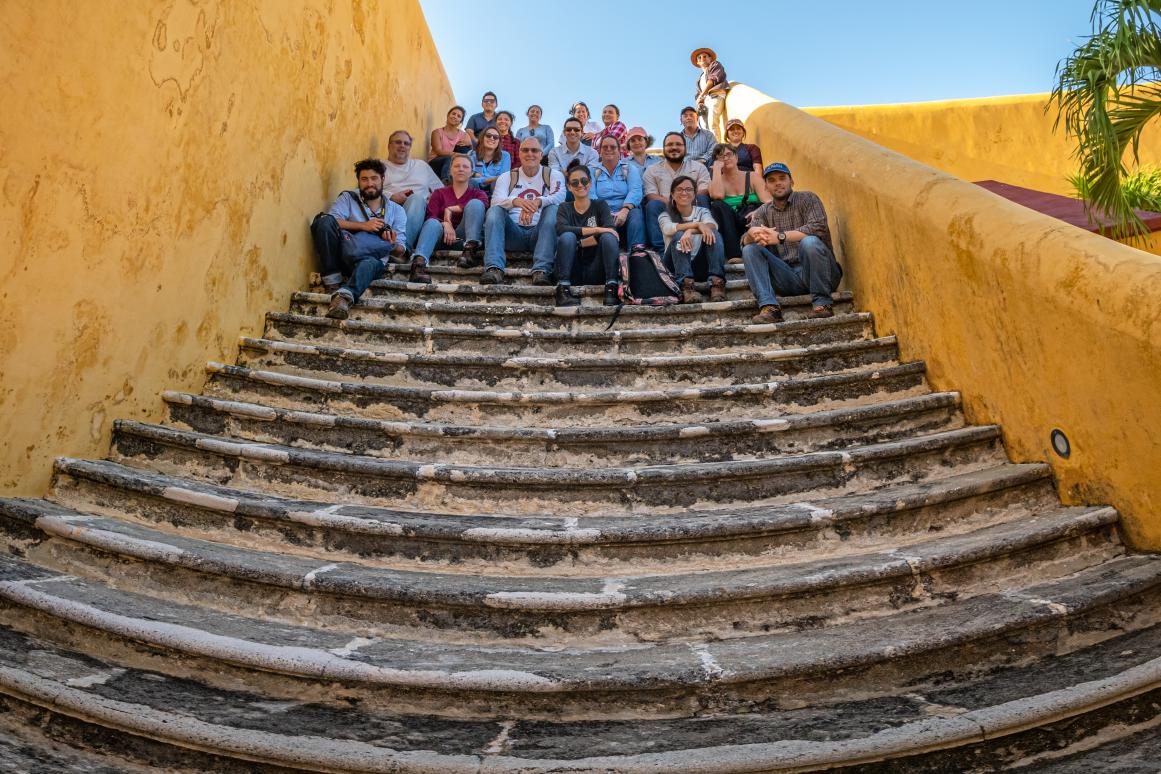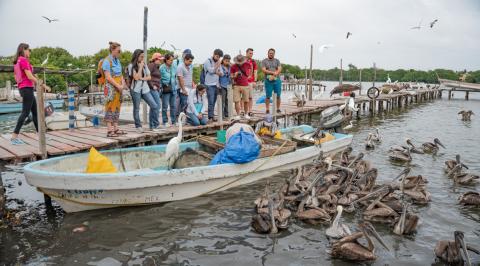HRI’s International Program: 25 Years of Collaboration Across Borders

This is part of a series of stories looking at the history and impact of HRI over the last 25 years.
Nuno Simões traveled from Mexico to Houston in 2014 to attend the Gulf of Mexico Summit and hear renowned oceanographer and marine biologist Sylvia Earle.
There, he met Dr. Wes Tunnell where he found himself in perspective and career-changing conversations about the Gulf’s little-known but exceptionally diverse invertebrate species. Tunnell invited Simões to the Harte Research Institute (HRI) at Texas A&M University-Corpus Christi, where he also connected with Executive Director Dr. Larry McKinney.
McKinney and Tunnell were paramount in the development of Simões’ research project on invertebrate diversity in the southern Gulf. Ultimately funded by the Harte Charitable Foundation, the five-year study (2015-2019) coincided with Simões joining HRI in 2017 as the Furgason Fellowship International Chair for Coastal and Marine Studies in Mexico.
Collaboration with two of HRI’s most influential leaders shaped not only Simões’ research but also his understanding of the Gulf as a shared system linking three nations, and was empowered by HRI’s commitment to strengthening bonds across them.
“That project opportunity completely changed my vision, perspective and awareness of what was important, and what was possible,” Simões said. “Always based in good science, but through the Gulf Summits and their advice I started to look at the issues with a more applied lens.”
Since inception, HRI has understood and prioritized building ties between the United States, Mexico, and Cuba, as a means to address the impact across all three countries, recognizing what happens in one country affects all three. Over the last 25 years, HRI’s international program has deepened connections, building bridges through cooperation and science.
“The importance of working with Mexico and Cuba, I believe lies above all in that it provides the opportunity to exchange visions, points of view, and enrich experiences,” said Dr. Silvia Patricia González Díaz, HRI’s Furgason Fellowship International Chair for Coastal and Marine Studies in Cuba. “We have the opportunity to learn from colleagues from other countries, and that is extremely enriching and generates qualitatively superior benefits for our entire region.”
Whether it’s through research studies, research summits or student programs HRI’s international efforts have expanded on Ed Harte’s vision for cooperation across the Gulf.
“These international relationships are not just important, they are essential to the success of the program and to HRI’s mission,” Simões said. “The Gulf is a large, interconnected ecosystem managed by three different nations. Without strong, trust-based relationships with partners in Mexico and Cuba, HRI’s vision of a sustainable Gulf would be incomplete and unachievable.”

HRI fosters international cooperation through the Ferguson Fellowship Endowment, established in 2007, which funds international workshops and teaching research fellowships at HRI for scholars from Mexico and Cuban universities.
In 2016, HRI added the Dr. John “Wes” Tunnell Jr. Fellowship to support Mexican and American graduate students pursing Gulf-focused research while obtaining their degrees. Other exciting tri-national initiatives include the State of the Gulf Summits, workshops in Cuba, and the Student Workshop on International Coastal and Marine Management (SWIMM) program, a hands-on training initiative that unites graduate students from the U.S., Mexico, and Cuba to collaboratively address Gulf challenges.
These fellowships and initiatives are a true reflection of HRI’s long-term commitment to fostering cross-border collaboration, creating opportunities for shared research and learning that strengthen the Gulf community.
“Being part of HRI’s international program, specifically as its International Chair in Mexico, means embodying a mission of cross-border collaboration for the health of the Gulf,” Simões said. “It means acting as a catalyst for collaborative science, capacity building, and educational exchange between nations.”
